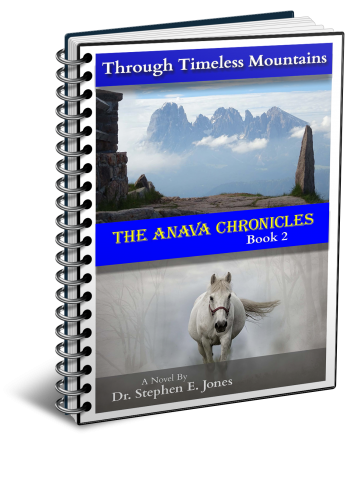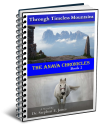Latest Posts
View the latest posts in an easy-to-read list format, with filtering options.

This is the sequel to Light from the Crack. In this sequel, we go back in time to ancient Israel just before the start of the Philistine captivity to talk to the twelve princes of the tribes, Eli, Boaz, and others who lived at that time. I give them a message about freedom and how to avoid captivity.
Category - Biblical Novels

“I had a dream last night,” I said to Sipporah and to Gushgalu, our new friend.
“Let us hear it,” Gushgalu responded. “Perhaps we can derive some guidance or purpose.”
“I dreamed that I was standing on a flat rock part way up a mountain and that I was looking down over a valley. I then heard a voice telling me, ‘You are on a treasure hunt. Find the lost treasure and help others to distinguish that which has true value from that which glitters and dazzles men’s eyes.’ A hand then pointed to a large boulder not far from the base of the mountain. On the boulder was ancient writing, which was too distant for me to read. Then the dream ended.”
“I have seen that boulder,” said Gushgalu. “We call it the Stone of Destiny. The flat rock overlooking the Stone is called Oahe. 7 It is at the entrance to the cave in the Mountain of Destiny.”
“It sounds like that is where we are to go,” Sipporah remarked.
“We will be there by nightfall,” Gushgalu informed us, “unless we are delayed in some way.” But we were not delayed. The weather was warm, and the breeze made the day pleasant. The sky was cloudless and blue. The forested mountains rose steeply on each side of the stream in the canyons that we traversed. A diverse blend of wild flowers, responding to the breath of God, danced gracefully along the narrow trail near the shallow stream.
Finally, as we rounded a bend in the trail, Gushgalu stopped and pointed to the next mountain that had become visible and said, “There! That is the Mountain of Destiny! The place you seek is on the east side, which overlooks a small valley.”
We pushed on, eager to reach our first goal, for we were curious about what we might find and eager to know what type of path lay beyond the mountain itself.
“It is an old mountain,” Gushgalu added. “All of the peaks in the Timeless Mountains are ancient. The rocks have observed many things and know all the secrets of men who have passed by. They see into the hearts of men and hear the thoughts and intents of their hearts, and all secrets are recorded in the silent stone.”
“Most men,” I said thoughtfully, “lack the instruments to hear these recorded secrets. If men had such instruments and if they knew the rocks were natural scribes of true history, they might be more careful what they say or think as they pass by. It is not so different from sounds that are recorded on phonograph records.”
“Some day the stones will cry out,” Sipporah said prophetically. “Much is hidden, but nothing is forgotten or lost. The day will come when all of the secrets of men and the hidden things in their hearts will be spoken openly. 8 Then every deed will be revealed and judged.”
“Only then can we know the real value of every thought and deed,” I added. “But it is perhaps fortunate that men now lack the proper instruments to hear these things, for if they were known openly, many would be shamed and embarrassed. Such a day is best left for the end of the age when all is judged, redeemed, and restored.”
We continued on our journey in silence until we passed through a narrow gorge and entered a small valley at the base of the mountain. There was a narrow lake in the valley from which flowed the stream that we had been following. Farther up the valley, the stream flowed into the lake, meandering into the distance, where it hid behind the trees at the base of the next mountain.
As we approached the imposing strength and weight of Destiny, a small meadow came into view, sloping gently upward toward an opening in the rocky face. We turned our horses, following Gushgalu’s lead, and made our way toward a boulder planted in the middle of the meadow. We dismounted next to the boulder and walked toward it, drawn by the mystery of the ancient writing inscribed upon a flat surface on one side of the rock. 9
“The writing is from a forgotten language. Our ancestors wrote this when they first arrived here under Chief Zaphnath. But no one today knows what it says,” Gushgalu informed us.
“That is unfortunate,” I said. I placed my hand on the rock, took a deep breath, and closed my eyes in meditation. Soon I heard a voice, distant at first, but louder after a few moments: “I am Yahweh, your God, who brought you out of the land of Egypt, out of the house of slavery. You shall have no other gods before Me.”
“These are the laws of the land,” I said, after repeating the words that I had heard. “They are Ten Commandments, or basic principles setting forth the Creator’s goodness, which men are to imitate.”
Sipporah then put her hand upon the writing, and after a short time of meditation stated, “I am hearing a softer voice from a deeper source within the rock. The words are the same, but the intent is different. By this voice deep within, the words are more than commands. They are promises from the Creator. He is the true Rock of stability and the Mountain of Destiny, and His will shall prevail in the end. His purpose is to change us by His Spirit, so that we will have no other gods before Him. Neither will we steal or murder or lie or covet. This promise is as old as the Timeless Mountains, but it establishes the destiny of all men. That is why this immovable boulder is planted here in the earth.”
“That indeed is good news!” exclaimed Gushgalu. “The promise has endured many storms and earthquakes. There have been many wars and broken promises over the millennia, but all such violations of the law will themselves be broken upon the promises written on this rock.”
“The light will shine again as at the beginning of time,” I answered, “and the One whose laws these are will be all in all. There is no force or power of the will of man that can move this rock or stop His will from being done. It only requires patience on our part. We must have faith that what He has promised, He can and will accomplish.”
Looking up at the mouth of the cave above us, Sipporah remarked, “That is no ordinary or natural cave.”
“No,” Gushgalu replied. “This was made by miners searching for gold and silver. It was abandoned many years ago.”
“I remember my father telling me about this cave,” I said. “He and Joe found and explored this cave, and he claimed that they found what the earlier miners had missed. Apparently, the miners had stopped about two feet short of a large vein of gold. My father and Joe spent some time digging, and they found this rich vein. But I do not recall what they did with the gold.”
“I heard that they reburied it,” Gushgalu said. “They would not take it for themselves, because this land did not belong to them. They told our Chief about it, but none of us had any use for the gold, so it has remained buried to this day. In fact, it is buried somewhere near this boulder—perhaps under our feet where we now stand.”
“Then there it will remain until the Creator finds use for it,” I said resolutely. “He is the Owner of the land, and He claims all the gold and silver and other minerals for Himself. Someday this wealth will be used to build His Kingdom and to support His government on earth.”
“So it must remain buried here for now,” Sipporah said. “Perhaps someday the treasure will be unearthed and used by those who know how to steward such wealth without greed and covetousness.”
“Yes, my dear,” I replied. “And since the Zaphnath tribe has been called to steward this land, they are the ones called to decide when that should happen and how.”
“You are like your father,” Gushgalu said, studying my face.
“What do you mean?” I asked.
“You do not have the yellow fever. Gold does not cause you to go crazy. Whiskey makes Indians crazy; gold makes white men crazy.”
“Sadly, that is true,” I said with a slight smile and a nod. “We all have a disease to overcome. Fortunately, the Creator has also given us the cure, if we will but listen. Stewards have immunity from yellow fever. The cure for yellow fever,” I continued with a smile, “is to stop acting like a white man and start being a steward instead.”
He laughed good naturedly. “Someday we will all know how to steward our gifts,” he said.
“The time to build is drawing near,” I replied. “I feel it inside. The Creator made gold and silver for His own use, and when the time comes, someone will know what to do with it.”
“We should set up our camp for the night,” Gushgalu said, glancing at the sun that was now falling behind a distant mountain. “Now that you are here, I am not sure what your next step will be, but perhaps it will come to you in the night.”
Sipporah and I set up our tent next to the boulder and slept with our heads near its base. During the night, a man full of light appeared to me in a dream and said, “Anava, speak to the rock beside you. Tell it to bring forth life to all who live in this valley. Then go through the mountain and deliver My words of truth to those that are called. Search for hidden treasure and bring it to light.”